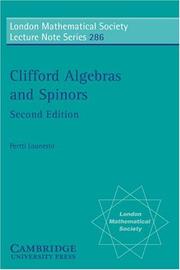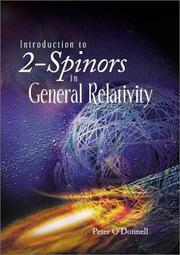| Listing 1 - 6 of 6 |
Sort by
|

ISBN: 1139883542 1107365643 1107370388 1107360730 1107369835 1299403468 1107363187 0511526024 9781107360730 9780511526022 9781107365643 0521005515 9780521005517 Year: 2001 Publisher: Cambridge New York Cambridge University Press
Abstract | Keywords | Export | Availability | Bookmark
 Loading...
Loading...Choose an application
- Reference Manager
- EndNote
- RefWorks (Direct export to RefWorks)
In this book, Professor Lounesto offers a unique introduction to Clifford algebras and spinors. The initial chapters could be read by undergraduates; vectors, complex numbers and quaternions are introduced with an eye on Clifford algebras. The next chapters will also interest physicists, and include treatments of the quantum mechanics of the electron, electromagnetism and special relativity with a flavour of Clifford algebras. This book also gives the first comprehensive survey of recent research on Clifford algebras. A new classification of spinors is introduced, based on bilinear covariants of physical observables. This reveals a new class of spinors, residing between the Weyl, Majorana and Dirac spinors. Scalar products of spinors are classified by involutory anti-automorphisms of Clifford algebras. This leads to the chessboard of automorphism groups of scalar products of spinors. On the analytic side, Brauer-Wall groups and Witt rings are discussed, and Caucy's integral formula is generalized to higher dimensions.
Clifford algebras. --- Spinor analysis. --- Calculus of spinors --- Spinor calculus --- Spinors, Theory of --- Algebra --- Wave mechanics --- Calculus of tensors --- Vector analysis --- Geometric algebras --- Algebras, Linear

ISBN: 1281935727 9786611935726 9812795316 9789812795311 9781281935724 9789812383075 9812383077 661193572X Year: 2003 Publisher: Singapore River Edge, NJ World Scientific
Abstract | Keywords | Export | Availability | Bookmark
 Loading...
Loading...Choose an application
- Reference Manager
- EndNote
- RefWorks (Direct export to RefWorks)
This book deals with 2-spinors in general relativity, beginning by developing spinors in a geometrical way rather than using representation theory, which can be a little abstract. This gives the reader greater physical intuition into the way in which spinors behave. The book concentrates on the algebra and calculus of spinors connected with curved space-time. Many of the well-known tensor fields in general relativity are shown to have spinor counterparts. An analysis of the Lanczos spinor concludes the book, and some of the techniques so far encountered are applied to this. Exercises play an important role throughout and are given at the end of each chapter.
General relativity (Physics) --- Spinor analysis. --- Calculus of spinors --- Spinor calculus --- Spinors, Theory of --- Algebra --- Wave mechanics --- Calculus of tensors --- Vector analysis --- Relativistic theory of gravitation --- Relativity theory, General --- Gravitation --- Physics --- Relativity (Physics)
Book
ISBN: 303000404X 3030004031 Year: 2018 Publisher: Cham : Springer International Publishing : Imprint: Springer,
Abstract | Keywords | Export | Availability | Bookmark
 Loading...
Loading...Choose an application
- Reference Manager
- EndNote
- RefWorks (Direct export to RefWorks)
This book explores the Lipschitz spinorial groups (versor, pinor, spinor and rotor groups) of a real non-degenerate orthogonal geometry (or orthogonal geometry, for short) and how they relate to the group of isometries of that geometry. After a concise mathematical introduction, it offers an axiomatic presentation of the geometric algebra of an orthogonal geometry. Once it has established the language of geometric algebra (linear grading of the algebra; geometric, exterior and interior products; involutions), it defines the spinorial groups, demonstrates their relation to the isometry groups, and illustrates their suppleness (geometric covariance) with a variety of examples. Lastly, the book provides pointers to major applications, an extensive bibliography and an alphabetic index. Combining the characteristics of a self-contained research monograph and a state-of-the-art survey, this book is a valuable foundation reference resource on applications for both undergraduate and graduate students.
Spinor analysis. --- Clifford algebras. --- Geometric algebras --- Algebras, Linear --- Calculus of spinors --- Spinor calculus --- Spinors, Theory of --- Algebra --- Wave mechanics --- Calculus of tensors --- Vector analysis --- Geometry. --- Group theory. --- Mathematical physics. --- Group Theory and Generalizations. --- Mathematical Methods in Physics. --- Physical mathematics --- Physics --- Groups, Theory of --- Substitutions (Mathematics) --- Mathematics --- Euclid's Elements --- Physics. --- Natural philosophy --- Philosophy, Natural --- Physical sciences --- Dynamics

ISBN: 1316138941 0511867662 131614125X 1316139565 0511938586 1316143236 1316140695 051156404X 9781316140697 9780511564048 0521245273 9780521245272 9780521337076 Year: 1984 Publisher: Cambridge Cambridge University Press
Abstract | Keywords | Export | Availability | Bookmark
 Loading...
Loading...Choose an application
- Reference Manager
- EndNote
- RefWorks (Direct export to RefWorks)
This volume introduces and systematically develops the calculus of 2-spinors. This is the first detailed exposition of this technique which leads not only to a deeper understanding of the structure of space-time, but also provides shortcuts to some very tedious calculations. Many results are given here for the first time.
Spinor analysis. --- Space and time. --- Geometry, Differential. --- Mathematical physics. --- Physical mathematics --- Physics --- Differential geometry --- Space of more than three dimensions --- Space-time --- Space-time continuum --- Space-times --- Spacetime --- Time and space --- Fourth dimension --- Infinite --- Metaphysics --- Philosophy --- Space sciences --- Time --- Beginning --- Hyperspace --- Relativity (Physics) --- Calculus of spinors --- Spinor calculus --- Spinors, Theory of --- Algebra --- Wave mechanics --- Calculus of tensors --- Vector analysis --- Mathematics
Book
ISBN: 3030278360 3030278352 Year: 2019 Publisher: Cham : Springer International Publishing : Imprint: Springer,
Abstract | Keywords | Export | Availability | Bookmark
 Loading...
Loading...Choose an application
- Reference Manager
- EndNote
- RefWorks (Direct export to RefWorks)
This book contains a systematic exposition of the theory of spinors in finite-dimensional Euclidean and Riemannian spaces. The applications of spinors in field theory and relativistic mechanics of continuous media are considered. The main mathematical part is connected with the study of invariant algebraic and geometric relations between spinors and tensors. The theory of spinors and the methods of the tensor representation of spinors and spinor equations are thoroughly expounded in four-dimensional and three-dimensional spaces. Very useful and important relations are derived that express the derivatives of the spinor fields in terms of the derivatives of various tensor fields. The problems associated with an invariant description of spinors as objects that do not depend on the choice of a coordinate system are addressed in detail. As an application, the author considers an invariant tensor formulation of certain classes of differential spinor equations containing, in particular, the most important spinor equations of field theory and quantum mechanics. Exact solutions of the Einstein–Dirac equations, nonlinear Heisenberg’s spinor equations, and equations for relativistic spin fluids are given. The book presents a large body of factual material and is suited for use as a handbook. It is intended for specialists in theoretical physics, as well as for students and post-graduate students of physical and mathematical specialties.
Spinor analysis. --- Calculus of spinors --- Spinor calculus --- Spinors, Theory of --- Algebra --- Wave mechanics --- Calculus of tensors --- Vector analysis --- Physics. --- Elementary particles (Physics). --- Quantum field theory. --- Cosmology. --- Mathematical physics. --- Algebraic geometry. --- Mathematical Methods in Physics. --- Elementary Particles, Quantum Field Theory. --- Mathematical Physics. --- Algebraic Geometry. --- Algebraic geometry --- Geometry --- Physical mathematics --- Physics --- Astronomy --- Deism --- Metaphysics --- Relativistic quantum field theory --- Field theory (Physics) --- Quantum theory --- Relativity (Physics) --- Elementary particles (Physics) --- High energy physics --- Nuclear particles --- Nucleons --- Nuclear physics --- Natural philosophy --- Philosophy, Natural --- Physical sciences --- Dynamics --- Mathematics
Book
ISBN: 0817649832 1283946068 0817649840 Year: 2010 Publisher: New York : Birkhauser,
Abstract | Keywords | Export | Availability | Bookmark
 Loading...
Loading...Choose an application
- Reference Manager
- EndNote
- RefWorks (Direct export to RefWorks)
Without using the customary Clifford algebras frequently studied in connection with the representations of orthogonal groups, this book gives an elementary introduction to the two-component spinor formalism for four-dimensional spaces with any signature. Some of the useful applications of four-dimensional spinors, such as Yang–Mills theory, are derived in detail using illustrative examples. Key topics and features: • Uniform treatment of the spinor formalism for four-dimensional spaces of any signature, not only the usual signature (+ + + −) employed in relativity • Examples taken from Riemannian geometry and special or general relativity are discussed in detail, emphasizing the usefulness of the two-component spinor formalism • Exercises in each chapter • The relationship of Clifford algebras and Dirac four-component spinors is established • Applications of the two-component formalism, focusing mainly on general relativity, are presented in the context of actual computations Spinors in Four-Dimensional Spaces is aimed at graduate students and researchers in mathematical and theoretical physics interested in the applications of the two-component spinor formalism in any four-dimensional vector space or Riemannian manifold with a definite or indefinite metric tensor. This systematic and self-contained book is suitable as a seminar text, a reference book, and a self-study guide. Reviews from the author's previous book, 3-D Spinors, Spin-Weighted Functions and their Applications: In summary…the book gathers much of what can be done with 3-D spinors in an easy-to-read, self-contained form designed for applications that will supplement many available spinor treatments. The book…should be appealing to graduate students and researchers in relativity and mathematical physics. —Mathematical Reviews The present book provides an easy-to-read and unconventional presentation of the spinor formalism for three-dimensional spaces with a definite or indefinite metric...Following a nice and descriptive introduction…the final chapter contains some applications of the formalism to general relativity. —Monatshefte für Mathematik.
Mathematics. --- Physics. --- Spinor analysis. --- Spinor analysis --- Mathematics --- Engineering & Applied Sciences --- Applied Physics --- Algebra --- Calculus --- Physical Sciences & Mathematics --- Calculus of spinors --- Spinor calculus --- Spinors, Theory of --- Topological groups. --- Lie groups. --- Applied mathematics. --- Engineering mathematics. --- Gravitation. --- Topological Groups, Lie Groups. --- Mathematical Methods in Physics. --- Classical and Quantum Gravitation, Relativity Theory. --- Applications of Mathematics. --- Wave mechanics --- Calculus of tensors --- Vector analysis --- Topological Groups. --- Mathematical physics. --- Math --- Science --- Physical mathematics --- Physics --- Groups, Topological --- Continuous groups --- Engineering --- Engineering analysis --- Mathematical analysis --- Field theory (Physics) --- Matter --- Antigravity --- Centrifugal force --- Relativity (Physics) --- Natural philosophy --- Philosophy, Natural --- Physical sciences --- Dynamics --- Groups, Lie --- Lie algebras --- Symmetric spaces --- Topological groups --- Properties
| Listing 1 - 6 of 6 |
Sort by
|

 Search
Search Feedback
Feedback About UniCat
About UniCat  Help
Help News
News